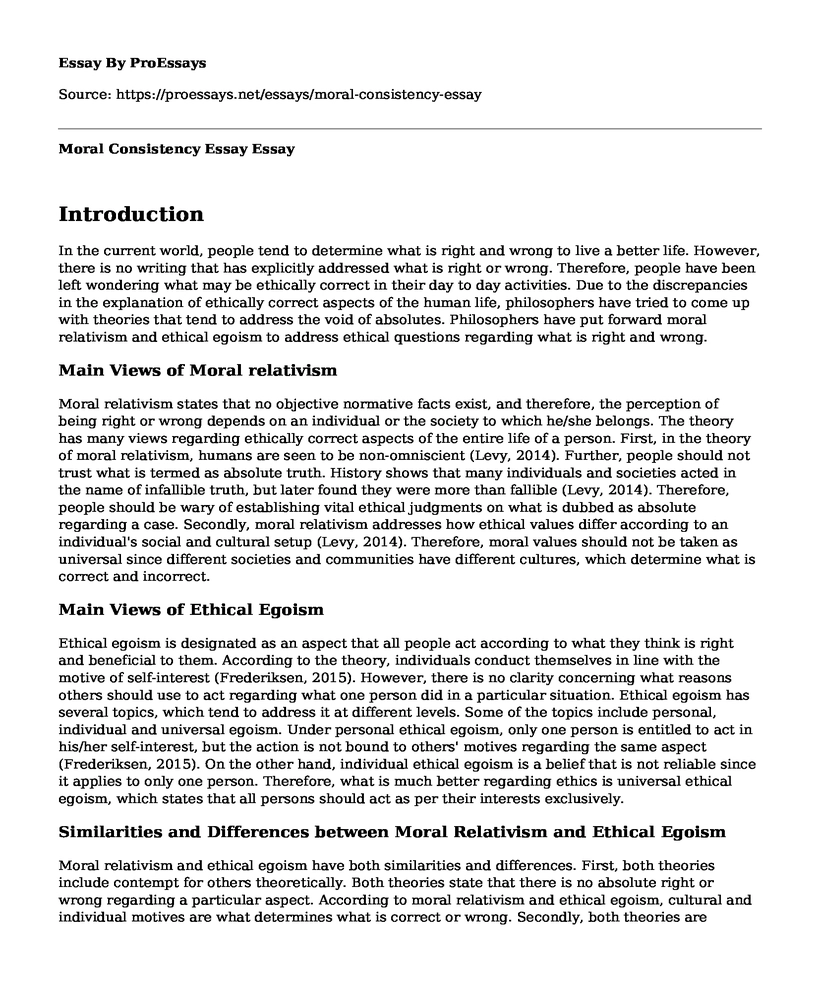Introduction
In the current world, people tend to determine what is right and wrong to live a better life. However, there is no writing that has explicitly addressed what is right or wrong. Therefore, people have been left wondering what may be ethically correct in their day to day activities. Due to the discrepancies in the explanation of ethically correct aspects of the human life, philosophers have tried to come up with theories that tend to address the void of absolutes. Philosophers have put forward moral relativism and ethical egoism to address ethical questions regarding what is right and wrong.
Main Views of Moral relativism
Moral relativism states that no objective normative facts exist, and therefore, the perception of being right or wrong depends on an individual or the society to which he/she belongs. The theory has many views regarding ethically correct aspects of the entire life of a person. First, in the theory of moral relativism, humans are seen to be non-omniscient (Levy, 2014). Further, people should not trust what is termed as absolute truth. History shows that many individuals and societies acted in the name of infallible truth, but later found they were more than fallible (Levy, 2014). Therefore, people should be wary of establishing vital ethical judgments on what is dubbed as absolute regarding a case. Secondly, moral relativism addresses how ethical values differ according to an individual's social and cultural setup (Levy, 2014). Therefore, moral values should not be taken as universal since different societies and communities have different cultures, which determine what is correct and incorrect.
Main Views of Ethical Egoism
Ethical egoism is designated as an aspect that all people act according to what they think is right and beneficial to them. According to the theory, individuals conduct themselves in line with the motive of self-interest (Frederiksen, 2015). However, there is no clarity concerning what reasons others should use to act regarding what one person did in a particular situation. Ethical egoism has several topics, which tend to address it at different levels. Some of the topics include personal, individual and universal egoism. Under personal ethical egoism, only one person is entitled to act in his/her self-interest, but the action is not bound to others' motives regarding the same aspect (Frederiksen, 2015). On the other hand, individual ethical egoism is a belief that is not reliable since it applies to only one person. Therefore, what is much better regarding ethics is universal ethical egoism, which states that all persons should act as per their interests exclusively.
Similarities and Differences between Moral Relativism and Ethical Egoism
Moral relativism and ethical egoism have both similarities and differences. First, both theories include contempt for others theoretically. Both theories state that there is no absolute right or wrong regarding a particular aspect. According to moral relativism and ethical egoism, cultural and individual motives are what determines what is correct or wrong. Secondly, both theories are pragmatic and use opinions from impacts to defend the means to an end. Therefore, no objective normative fact exists according to moral relativism, as well as ethical egoism.
However, there is a slight difference between moral relativism and ethical egoism. Whereas moral relativism has set of commands regarding dispute resolution, ethical egoism does not have any set of command concerning resolving a particular issue. In ethical egoism, every subject believes he/she is right since he/she did his/her actions according to self-interest (Frederiksen, 2015). Therefore, it becomes hard to judge who is right and wrong regarding the actions since everyone benefited from the undertakings. On the other hand, moral relativism has set of commands regarding dispute resolution since it refers judgments to similar actions that may have happened in the past.
Conclusion
In conclusion, it is clear that both the theory of moral relativism and ethical egoism try to address the void of absolutes. However, the theories differ in some aspects regarding the judgment of different actions. Moreover, both theories have views, which on some occasions, coincide while in some they differ exclusively. Therefore, moral relativism and ethical egoism are among the theories that have been put forward to determine what is ethically correct.
References
Frederiksen, C. S. (2015). Ethical Egoism; Ethical Theories; Utilitarianism. Dictionary of Corporate Social Responsibility. Retrieved from https://books.google.com/books?hl=en&lr=&id=cQneCgAAQBAJ&oi=fnd&pg=PR5&dq=ethical+egoism&ots=w2v2CF7aE5&sig=FM4rLPdUH78KvUNSa8S5La2awrw
Levy, N. (2014). Moral relativism: A short introduction. Oneworld Publications. Retrieved from https://books.google.com/books?hl=en&lr=&id=y00QBwAAQBAJ&oi=fnd&pg=PT5&dq=MORAL+RELATIVISM&ots=LXw-CKsafr&sig=q8U8WMR1s0ACi-5YRQmuATMjGx8
Cite this page
Moral Consistency Essay. (2022, May 09). Retrieved from https://proessays.net/essays/moral-consistency-essay
If you are the original author of this essay and no longer wish to have it published on the ProEssays website, please click below to request its removal:
- Historical Context of Simulation Hypothesis Essay
- Ethical Theory: Ethical Egoism Essay Example
- The Concept of Tabula Rasa and Innatism and Free Will Essay
- Meditations in Philosophy of Descartes Essay Example
- Cultures and Beliefs - Essay Sample
- Ethical Decision Making and Cases Paper Example
- Essay Sample on Ethics and Morality: Crucial Aspects of Individuals in Society







